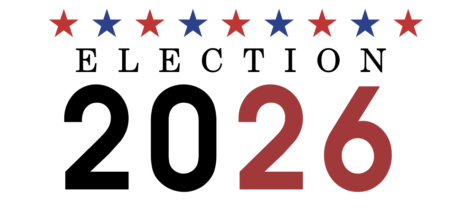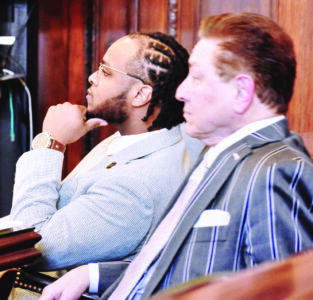Commissioners, McNally rail against bump in property tax

Staff photo / Ed Runyan
State Rep. Lauren McNally, at the podium spoke to reporters Thursday at the Mahoning County Courthouse about what she called the ‘unprecedented increase in property taxes.’ Joining her were county commissioners Carol Rimedio Righetti, David Ditzler and Anthony Traficanti.
YOUNGSTOWN — State Rep. Lauren McNally, D-59th of Youngstown, joined with the Mahoning County commissioners on Thursday to talk to reporters about what McNally called an “unprecedented increase in property taxes.” They spoke at the Mahoning County Courthouse.
McNally started talking to the commissioners about the issue several months ago, including a public meeting in May. She said Thursday the public needed an “update” to understand that the increases property owners are seeing in their property taxes “solely rests on the state legislature, and it’s a choice.”
She said legislators over a couple of decades have engaged in “tax shifting,” which is “shifting taxes away from the state and onto local homeowners and communities.” She said it is “forcing communities and local homeowners to pay more than their fair share to keep police, fire and safety personnel on the streets.”
McNally said she has been working in Columbus and with local leaders like the Mahoning County commissioners to “find solutions that will lower our property taxes and create a fairer system that doesn’t constantly require property owners to pick up the tab.”
She said Thursday’s press conference was to urge state leaders in Columbus to “get serious about proving real relief to all Ohioans. We absolutely can lower our property taxes, reduce costs and still support essential services if we ensure that the state pays its fair share and returns our tax dollars to our local communities.”
She said the cost of rising property taxes as seen in the most recent property revaluation last year is “not a natural occurrence.” For example, the state has “long neglected to fund Ohio public schools,” she said. “Over the past decade the state has shifted funding away from our local communities to benefit private schools,” she said. “This year it cost us a billion dollars alone.”
It has led to the public schools having to make up the difference or “they have to do more with less.” It means going to voters to ask for more money, she said.
She said it has led to Ohioans having to vote more on school levies “than any other state over the last 20 years.” It is “why homeowners are feeling the pinch in their bills.” It is especially hard on senior citizens and working middle class families, “who are stretched thin,” she said.
Another example of “tax shifting” has been cuts to local government funds from the state, she said. Local governments are having to get by with about $1 billion less than they got in 2011, she said. It has led to more levies throughout the state for police and fire and other safety services.
And some legislators want to eliminate the Commercial Activity Tax, which could lead to about $400 million in losses to services such as libraries and emergency services by 2031, she said.
She said in most states, businesses pay more property taxes, and homeowners pay less. “Now Ohio homeowners and farmers are paying two thirds of the total property taxes,” she said. “Despite these giveaways, studies show that Ohio continues to trail the nation in job creation and has one of the worst economies in the United States,” she said.
In his remarks, Commissioner Anthony Traficanti said he is “taxed off, and so are the taxpayers of Ohio.” He thanked McNally for “bringing this to the attention of the state government. You are the only one who has answered this.”
He said the high increase in property values should not have come as a surprise to anyone.
“If the state legislature and the people doing the revaluations knew that this housing bubble was out of control, why did they do the revaluation based on the bloated, inflated cost of the housing market that hurt every senior (citizen), everybody who is on a fixed income?”
He said a taxpayer’s commission is needed to “monitor this every time we do a tax revaluation because now property taxes are getting worse than utilities. They are getting worse than gas prices at the pump.”
McNally said Ohio House Democrats have introduced the following legislation to help lower Ohioans’ property taxes:
HB 60 that would expand the homestead exemption to cover an additional 75,000 seniors and raise its value to $40,000, providing nearly $250 million in targeted relief.
HB 263 that would freeze over $400 million in property taxes for over 700,000 seniors making $50,000 or less.




